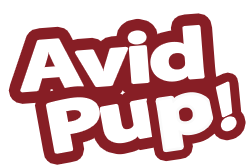
Ushering a newborn puppy into the world can be a huge joy for dog owners and breeders. It’s the beginning of a long journey ahead and you get to watch this tiny creature grow up into a faithful companion.
While the birthing process is a big event, it’s certainly not the end of your hard work.
While female dogs are fully equipped to support their young pups for the first several weeks of life, things don’t always go according to plan.
If the mother is not around, unwilling to care for the pup, or has an illness that’s preventing her from nursing, you’re going to have to take her place.
That’s where milk replacers come in. As the name would suggest, milk replacers are specifically formulated to act as an alternative to the mother’s milk.
There are a ton of great milk replacers on the market. As always, it’s important for you to take some time in choosing the right one.
Failing to provide your young puppy with all the nutrients they need could lead to malnutrition and severe health consequences. To start you off on the right foot, here are some of the best milk replacers available right now.
7 of the Best Puppy Milk Replacers
1. PetAg Esbilac Puppy Milk Replacer Powder
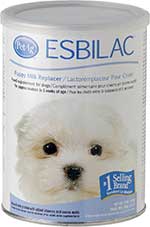
When prepared correctly, this formula from PetAg has about 13.5 calories per tablespoon. The calorie-dense replacer contains about 33 percent protein and an impressive 40 percent fat.
These basic macronutrients are perfect for supporting your puppy’s growing body. The powder milk replacer is relatively easy to prepare and has everything young pups need to stay healthy.
It’s chock-full of nutrients and is enriched for good digestive health. The prebiotics and probiotics work to start the canine’s system off on the right foot.
2. PetAg Esbilac 2nd Step Puppy Weaning Food
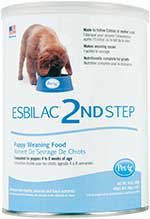
Also from PetAg is this weaning milk replacer. While it looks similar to the previous product, it’s formulated for puppies that are in the process of transitioning from standard milk to dry kibble.
It can be used to make a mash or be fed as-is. When water is added to the mix, the replacer takes on an oatmeal-like consistency. This helps the puppy get used to the sensation of chewing while still providing the easy digestibility they experienced with standard milk.
It has 26 percent protein and 12 percent fat, which is closer to what you’d find in a puppy kibble recipe.
3. Nutri-Vet Puppy Milk Replacement Powder
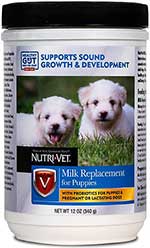
With 31 percent protein and 46 percent fat, this milk replacer has more than enough of the essentials to make your pup healthy. Whey is the primary protein source.
It also has 1 percent calcium and 1.5 percent phosphorus. This careful ratio will support bone growth. In addition to a healthy dose of vitamins and minerals, this particular contains Nutri-Vet’s Opti-Gut supplement.
Basically, it’s a probiotic that prevents digestive problems while also helping your pup’s system develop at a nice pace.
4. PetAg PetLac Puppy Milk Replacement Powder
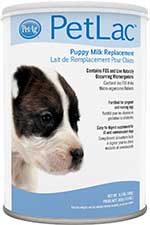
This particular formula from PetAg utilizes skimmed milk and vegetable protein to support your puppy’s health.
It’s designed to provide all of the essential macronutrients and micronutrients young pups need. Plus, it has naturally occurring microorganisms. These organisms keep the gut in good shape and work to avoid those nasty stomach upsets that puppies are prone to.
This is a powdered milk replacer. Once the water has been added, the milk can stay fresh in the refrigerator for up to two weeks.
5. 21st Century Essential Pet Puppy Milk Replacer Powder for Puppies & Pregnant or Lactating Dogs
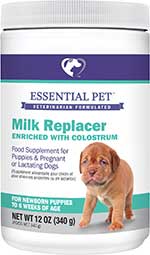
From 21st Century Essential Pet is this powdered milk replacer. It contains approximately 33 percent protein and 40 percent fat. In total, each tablespoon of prepared milk has about 13 calories.
Each serving is filled with essential nutrients and vitamins. The great thing about this product is that it’s made with human-grade ingredients. There are no potentially harmful fillers or unnecessary additives.
As if that weren’t enough, the powder is also made in an FDA-registered facility. So, you can rest easy knowing that it’s safe for your growing puppy.
Highly Digestible Milk Replacers for Puppies with Sensitive Stomachs
6. PetAg Goat’s Milk Esbilac Puppy Powder
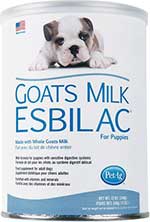
If your puppy is dealing with a sensitive stomach, this PetAg milk replacer may be the solution they need. It’s made out of dried goat’s milk.
The milk has slightly less lactose than standard cow milk. Not only that, but it’s filled with beneficial enzymes, fatty acids, and electrolytes. Pair that with the high protein content and a healthy dose of vitamins, and you have a complete dietary product to support your puppy’s development.
In total, this powder has 33 percent protein, 40 percent fat, and 13.5 calories per tablespoon.
7. GNC Pets Ultra Mega Premium Milk Replacer Goat’s Milk Puppy Powder Formula
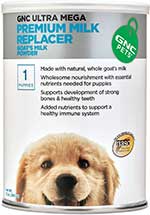
The premium milk replacer from GNC contains the perfect amount of protein and fat. Like the previous product, this formula is made primarily out of goat’s milk. This helps to improve digestion and offers a healthy food source for dogs with allergies.
The simple powder doesn’t have any artificial ingredients that could cause some potential harm. Instead, it has several vitamins and nutrients.
It’s designed to provide a complete newborn diet while also strengthening the immune system and supporting overall development.
Why Would You Need to Use a Milk Replacer?
There are several instances when a milk replacer formula will come in handy. The most obvious is post-birth. Not every female dog is capable or even willing to let puppies feed.
Take a moment to watch the mother for a bit in the weeks following the birth.
She’s tired, emotional, and probably a little weak. Like human mothers, canines can easily get irritated with the process. They just want to move on and get back to normal life.
For the most part, the mother will be protective of her kin. However, don’t be surprised if she’s just not willing to let her pups feed. In these cases, you’ll have to use a milk replacer to ensure that the puppy has the fuel they need to grow.
The Runt of the Litter
Even if the mother is doing her job, that doesn’t always mean that every puppy is getting everything they need. Depending on the size of the litter, you may find one lone runt.
This runt is often the smallest of the bunch and has a hard time getting a free nipple. Feeding time is a free for all! So, runts are often left by the wayside.
Milk replacers can turn that runt into another lively pup.
In the worst-case scenario, the mother may not be able to feed at all.
Whether the mother has died during the birthing process or she’s experiencing medical issues that are affecting her milk supply, the only way you can keep those little puppies alive is by feeding them milk replacers.
Other Uses of Puppy Milk Replacers
Finally, milk replacers can be used to provide some sustenance to adult dogs. Typically, people see milk formulas as a puppy-only product. However, that couldn’t be further from the truth!
At its core, a milk replacer is simply a nutrient-dense food.
You can give it to a pregnant dog to help her overcome the aches of pregnancy and support her growing body. Or, you can use it to soften up some kibble for a senior dog that has difficulty chewing.
Whatever the case may be, milk replacers are perfectly healthy for most dogs. They’re a versatile food product that’s designed to provide ample nutrition whenever your furry friend needs it most.
Finding the Right Milk Replacer
Like puppy food and standard kibble, the quality of the milk replacer you provide is crucial. The early weeks of life are a pivotal first step in your pup’s development, so it’s important to choose a product that’s going to benefit them.
Here are some things to look for when you’re trying to find the perfect milk replacer.
High Calorie Count
You’d be surprised at how many calories a young puppy needs to stay healthy. Puppies need significantly more calories per pound of bodyweight than adult dogs do. Thus, it’s a good idea to get a calorie-dense milk replacer.
Most manufacturers will provide some information about how many calories each serving has. Stick to the highest calorie count you can find.
This will ensure that your pup has all the energy their body needs to grow. Plus, it will make them feel full after every meal.
Related: Best High Calorie Puppy Food
Ample Protein
As you probably know, protein is the single most important macronutrient that canines need to thrive. Despite their penchant for sleeping, newborn pups are no different.
Your milk replacer should contain no less than 25 percent protein. Ideally, you should get something with 30 percent protein or more.
This protein will help support the growth of muscles and organs.
In just a few weeks, your young pup is going to double in size. That fast development takes a heavy toll on the body. Protein supports that growth and can prevent deformities from occurring.
High-Quality Fats
Fats are great for puppies. It’s a form of energy and directly feeds the cells. Milk replacers have the highest fat content of any canine meal. Growing pups need as much as 40 percent fat to stay healthy.
While it’s often a gut reaction to steer clear of fat, make sure that your pup is getting plenty of it.
Vitamins and Nutrients
Vitamins and nutrients are key to proper development. Even with the right amount of calories, protein, and fat, the milk replacer will be pointless without those crucial vitamins and nutrients to support various bodily functions.
Take a peek at the nutrient analysis and make sure that the formula has a complex profile of vitamins.
It should have things like Vitamin A, B12, E, D3, calcium, phosphorous, and more.
Vitamin D3 plays an important role in developing the heart and strengthening the immune system, both of which are quite weak after the birth.
Vitamin B12 metabolizes the ingredients of the formula, ensuring that your pup is able to take advantage of all the energy it provides.
Calcium and phosphorus are responsible for bone growth. Puppies need the right amount to avoid musculoskeletal problems.
These are just a few of the important vitamins and nutrients your puppy needs. Truth is, you can’t go wrong with providing your pup with as many nutrients as they can get.
As long as the replacer has all the essentials, it should serve your pup well.
Digestibility
Finally, let’s talk about digestibility. Young pups can come out of the womb with allergies and stomach sensitivity. If this is the case for your litter, you’ll need to choose a milk replacer that’s made with limited ingredients and absolutely no fillers.
Fillers should be avoided altogether, as they have no real practical purpose for your dog.
Stick with identifiable ingredients like whey, whole milk, egg product, and fat. Some formulas utilize goat’s milk to deal with stomach issues. This is a great healthy alternative to standard cow’s milk.
Others contain less lactose to closely mimick natural canine milk.
You may have to try different formulas and consult with your vet to find something that works for a puppy with a sensitive stomach.
However, once you find it, the replacer will do wonders to improve the pooch’s health and comfort.
Powder vs. Liquid Formulas
On your search for the best puppy milk replacer, you’ll find both liquid and powder options. There are pros and cons to both types of formulas.
Ultimately, the best choice for you will depend entirely on your needs and personal preference.
Powdered milk replacers are, by far, the most common on the market.
Before you feed them to your pup, you must add water and fully dissolve the powder. This can take some time and may be difficult when you have hungry pups at your feet.
With that said, powdered replacers have the added benefit of longer shelf life. They’re less susceptible to spoilage and are a great long-term option.
Liquid milk replacers are good if you want to provide your pups with fresh food immediately. The liquid is ready to be consumed straight from the bottle or can.
Just pour it into the feeding receptacle and you’re good to go.
The downside is that liquid milk replacers don’t last nearly as long as powered products. They tend to spoil pretty quickly after you open them. Thus, they must be fed to puppies quickly.
How to Feed a Puppy
Feeding a puppy with milk replacers is quite simple. Chances are, those young pups will have no qualms about gobbling the food up. All they know is that they’re hungry!
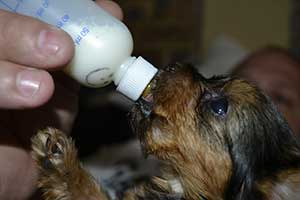
There are a couple of options when it comes to how you want to do the feeding.
Syringes are ideal if you want to have greater control over how much your pup eats. You can easily measure out a portion to prevent overfeeding.
Alternatively, you can go with a simple bottle. As long as the rubber nipple fits their mouth, the puppy will feed on it as if it were their mother.
Once you’ve selected the right tool, just prepare the replacer. If you have a powder, add water according to the directions on the packaging. With both liquid and powder, you’ll need to warm the milk replacer up.
Just place it in a bowl of hot water for a few minutes to bring the temperature up. Do not boil it or get it to the point of steaming.
To check if you have the right temperature, apply a bit to your hand. It should feel warm and comforting.
You can continue to feed your puppies the milk replacer until about six to eight weeks of age. Consult with your vet before you start transitioning to hard kibble.
Conclusion
Milk replacers can be a literal lifesaver when the mother’s milk just isn’t cutting it. We recommend having some milk on hand just in case natural feeding doesn’t work out.
The nutrients in the milk will bridge the gap and ensure that your puppy gets big and strong.
Also Read: High Calorie Puppy Food: 5 Best Picks to Help a Pup Gain Weight

